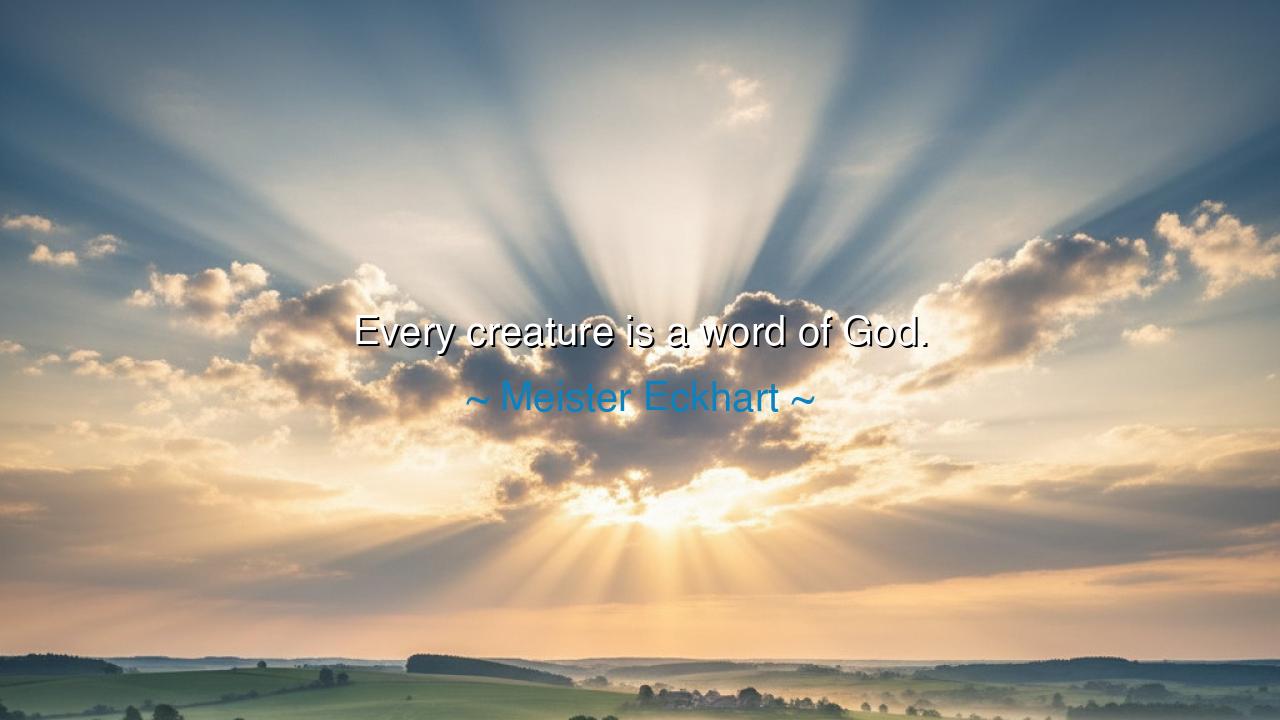
Every creature is a word of God.






The words “Every creature is a word of God” come from the mystic wisdom of Meister Eckhart, a 13th-century German theologian whose soul burned with the light of divine insight. In these few words, he spoke a truth that transcends creed and time — that every being, every leaf and stone, every bird and human, bears within it the utterance of the Divine Mind. Just as a poet’s essence is reflected in his verse, so too is God revealed through His creation. The universe is not silent; it is filled with living syllables of the divine — and every creature is one of them.
Eckhart belonged to the mystical stream within Christianity, one that sought to look beyond dogma to the living pulse of God in all things. When he said “Every creature is a word of God,” he invited humankind to see creation not as a mere product but as a living revelation — each being a sacred text to be read with reverence. The sparrow, the mountain, the child’s laughter — these are not separate from the holy; they are the vocabulary of the Eternal, spoken into being by Love itself. This vision shattered the walls between the sacred and the ordinary, between the church and the forest, between heaven and earth.
In ancient thought, the Word — the Logos — was not just speech but the divine reason, the ordering power that brings form to chaos. To Eckhart, each creature carries this Logos, a unique tone in the cosmic symphony. Thus, when we look upon creation with eyes that truly see, we perceive not randomness but meaning woven into matter. The cow grazing in the field, the river flowing ceaselessly to the sea, even the withering leaf — all of these speak, if we are quiet enough to listen. To despise or destroy them carelessly is to tear a page from the living book of God.
Consider the story of St. Francis of Assisi, who long before Eckhart walked through the woods and called the birds his brothers and the sun his father. To him, every creature radiated divine light. He spoke to them, not in madness, but in the deep understanding that they, too, were words of God, parts of the same eternal poem. Once, it is said, he preached to the birds, and they listened in silence, wings still, as though in worship. Such is the harmony of the awakened heart — to speak not above creation but within it, as one voice among many in the choir of existence.
This vision carries immense moral power. If every creature embodies a divine word, then cruelty, greed, and indifference toward nature are not mere moral failings — they are acts of blasphemy against the sacred language of the world. When we poison rivers, burn forests, or exploit animals, we silence voices in the divine chorus. And when we nurture, protect, and live in harmony with the living earth, we honor the Creator’s speech. Thus, true piety is not confined to prayer but expressed in how we treat the world that speaks God’s name.
The lesson, then, is one of reverence and attention. To live by this truth means learning to listen — to the murmur of wind, to the sorrow in another’s eyes, to the wisdom hidden in the soil beneath our feet. Every encounter, every form of life, is an opportunity to commune with the divine presence that animates all. We must not pass through the world as strangers; we must awaken to its voice, for to ignore creation is to ignore the God who speaks through it.
In our modern age — where noise drowns silence and screens veil the stars — Meister Eckhart’s words strike like a bell in the heart. “Every creature is a word of God” reminds us that spirituality is not escape from the world but a deeper seeing within it. The divine is not distant; it pulses in the breath of life, in the rustle of trees, in the kindness shared between two souls. The sacred has never left us — it only waits for us to open our eyes.
Practical actions: Begin each day by noticing something alive — a bird, a plant, a person — and regard it as a divine word. Care for it as you would care for scripture. Walk more slowly. Speak more gently. Protect what is fragile. In doing so, you become not just a reader of God’s words but a co-author in His living book — one whose pages are written in light, compassion, and awe.






AAdministratorAdministrator
Welcome, honored guests. Please leave a comment, we will respond soon